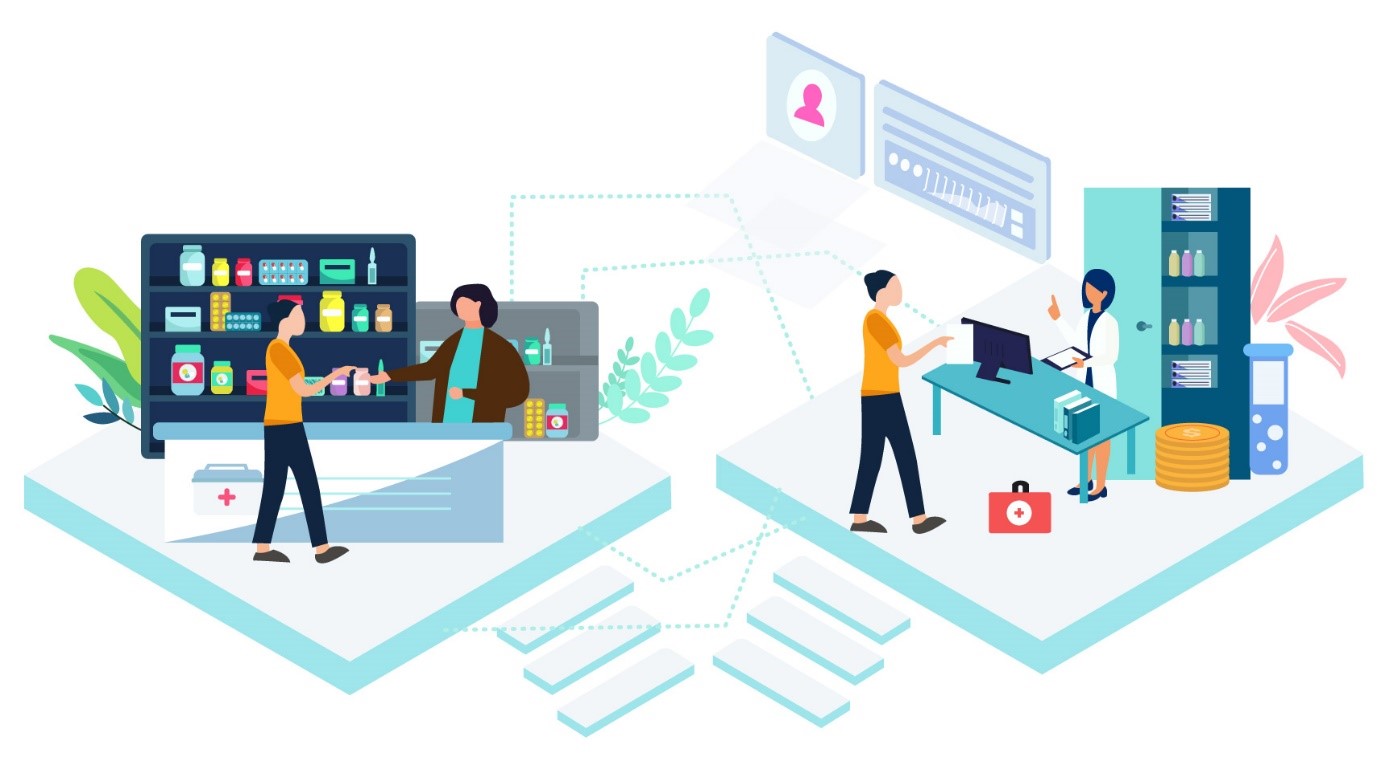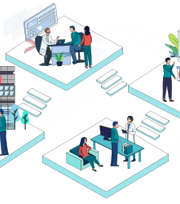Why do Hospitals need a good Hospital Management System?

A centralised and integrated system for collecting and collating data, storing it, retrieving it as required and using appropriate tools to analyse patient data is one of the key advantages of using a Hospital Management System. The centralisation of patient data helps also in improving the quality of care that is provided to the patient. Using it can greatly improve transparency and reduce clinical errors. Multiple staff have access to this centralised patient data as and when needed. In the long run, it is always cheaper and reliable to adopt a good Hospital Management System in a robust IT infrastructure setting than use separate applications to cover various aspects of the hospital processes or continuing to maintain paper records.
Having a non-integrated Hospital Management System cannot work in the best interest of the patient. Imagine a hospital where the Consultant charts the patient’s clinical history as an inpatient while all the investigations are recorded in a different application while the billing information is captured in a third software. The whole experience of the patient would be horrendous even as different staff members try to reconcile the data between the three applications. There would be severe loss of efficiency with revenue leakages, mismatch of clinical information, data entry errors, and recapture of patient information at different points. This is certainly not in the best interest of the patient and certainly not the hospital. Having an integrated application to manage the Hospital is a must. It offers the hospital a modular plug and play solution.
It is not necessary that the Hospital Management System that the hospital implements must have all modules to start with. It will suffice to have the most critical ones such as Appointments booking, Admissions Management, Pharmacy, Electronic Health Records, Laboratory Management, Radiology Management, Inpatient Management, and Billings among others. Each of these should talk with each other in an integrated fashion. Data flows need to be seamless thus eliminating the need for multiple vendors. Workflows need to be automated from admission to discharge. The entire patient journey becomes process driven thus eliminating the dependence on people, making it predictable and reliable. Intelligent analytics can be derived from the capture of data at each touchpoint to improve patient outcomes and operational efficiency.

Hospital Management Systems need to be flexible and versatile. It should be seen as a digital transformational software. There are several questions that one may ask about a Hospital Management System. These include:
- Can the Hospital Management System be customised and tailored by changing and altering processes if there is a need to do so?
- Is the Hospital Management System capable of handling solutions that are dictated by the market?
- Is the Hospital Management System geared to handle the changing expectations of the patients? The needs and demands of patients can keep changing with time. Is the Hospital Management System capable of identifying and handling them?
- Can the Hospital Management System adapt to market driven changes in a rapid fashion?
- Is there sufficient flexibility to offer services to both inpatients and outpatients?
- Is patient information available at all points? Is there a need to recapture patient information in multiple points?
- Does the Hospital Management System reduce variability and handle broken processes?
It is important that the Hospital Management System improve the morale and motivation of the healthcare staff. If the patient’s treatment history and all other critical patient information is available in a user-friendly manner, then it would make the task of the doctors that much easier. They do not have to spend loads of time in understanding the case facts or deciphering handwritten notes of the treating team. Documentation should be made available to each member of the team that is treating the patient so that the best decisions for the patient can be made. It fosters engagement, interest and motivates different stakeholders. Documentation is legible and there are rarely any complaints of any damaged or lost data. Studies have found that having a good Hospital Management System significantly reduces mortality and average length of patient stay. It can also enable high quality care for people in remote locations. Access to patient information and data is available whenever required. The usability of the Hospital Management System is as important as the number of features that are available. It should be easy to use, have a good user interface, and should be secure. Performance of the software must also be fast so that care givers are not spending an inordinate amount of time in entering and retrieving data. Processes should be streamlined across all the departments without compromising the need to ensure patient confidentiality. The Hospital Management System should have a good user management section to control data access and privileges to various team members. A good Hospital Management System supports evidence-based treatment as all clinical data is captured diligently. Improving operational efficiency of the hospital is a key focus on any Hospital Management System. It is important that all expenses and revenues are tracked seamlessly without the need for rigorous controls in place. The workflows within the hospital should enable ease of operations and plug all leakages.

A good Hospital Management System improves the efficiency of doctors by ensuring that accurate patient records are maintained in a timely manner and are accessible to the care team when ever it requires. Exact information supports evidence-based treatment. An interface that is intuitive and user friendly with easy entry of data is key to accurate and timely patient data. Patient outcomes are also therefore likely to be better. Quick access to patient data is very useful in emergencies. Readmissions is a challenge in most hospitals. It is important to minimise readmissions. Accurate patient data can help in the Consultants addressing other health problems and conditions proactively. Conflicts between treating teams and within the team can also be minimised when the Hospital Management System is leveraged well as all decisions become objective and data based. A Hospital Management System is especially useful to all stakeholders when it integrates seamlessly with different mobile devices. Once the framework of the Hospital Management System is in place, it integrates easily with IOT devices which makes real time monitoring of patients.

Having a centralised perspective of all patient data enables the Hospital with capacity planning and capability building. Comprehensive data on patient traffic for different hospital procedures can be used as a baseline for recruitment and skill building. If the hospital receives significant patient traffic that is trauma related due to proximity to a high accidents zone, the hospital can use the data to build its emergency medicine department in addition to Plastic and Reconstructive Surgery and Orthopaedic departments.
Easy referral and transmission of patient data should be facilitated by the Hospital Management System to support optimal patient care, thus improving, and transforming healthcare. In most Hospitals the process of patient check-in as an inpatient and the discharge process are tedious, time consuming and in many cases very frustrating. Can the patient be discharged directly from their rooms instead of having their family members wait for hours while the Hospital staff tally all the bills and get the discharge procedures done? The Hospital Management System when used correctly and fully organises patient data. This means that medical errors get minimised. Information about the patient’s vitals, medical history, allergies, social, smoking and drinking history are available which supports the Clinician take a more informed decision compared to when there is no information. Data analytics and decision support systems drive decision making. Data and information are continuously tracked which again helps in better clinical decisions. From a hospital administration perspective, the leadership can look at improving the working and efficiency of the hospital. Quality Management also improves significantly by using a Hospital Management System. Communication improvement efforts can also be initiated and greater sensitivity towards patients initiated in addition to building awareness in the community so that better utilisation of services can be ensured.
Providing a patient portal where the patient and his attendants have access to medical records helps in improving patient outcomes through preventive care. Awareness and management of diseases improves as well. Self-management of medical conditions becomes possible which is key to medical care. There are multiple points of interaction of the patient with the healthcare system. Improving the quality of each touchpoint in the patient’s journey is critical to improving not only patient care outcomes but also the efficiency of the hospital. Patient experience spans several touchpoints such as appointment booking, teleconsultation, communication with healthcare providers and access to information, among others. Quality of service at each touchpoint as applicable can be measured and corrective and remedial action can be taken.

In a hospital integration of various medical processes is achieved by using a Hospital Management Software. In addition to reducing medication errors and improving compliance with medical practices, there are several other advantages such as medication ordering, vaccination scheduling, lab and radiology ordering, improved patient handover, reducing no shows, reduction in patient waiting time, e-pharmacy and supply of medicines home, reduction in omission of critical patient information, reduced charting errors, improved patient medication adherence, eliminating lab mislabelling errors and improved disease awareness, institutionalisation of processes, and reduction in person dependence, among others.
- Critical components of a Hospital Management System
- Appointments Scheduling
- Patient Registration
- Inpatient Admission – bed allocation
- Billing and Financial Management
- Integration with Lab and Radiology
- Consultation Management
- OT Management – schedule, checklists, resource management
- Inventory Management
- Pay-outs to doctors
- Patient feedback mechanism
- Laboratory Management
- Pharmacy Management
- MIS Reports
- Barcode/QR code scanning
- Discharge Summary
- Third Party Administration
- Medical Records Management
- Analytics and Dashboards
- Assets Management
Conclusion
The Hospital Management System serves as the backbone of any hospital. It is important for all hospital processes to be comprehensively integrated into this system. The architecture of the system should enable easy customisation and addition of new modules. A hospital looking at a new implementation can look at integrating the key components initially and then expanding the scope of the System. Installing a ready HMS may not fit the Hospital’s requirements fully. Working with a vendor who provides for customisation in line with the processes of the Hospital may be a better choice compared to a ready made one.
The vendor may also provide the software in the cloud which would mean reduction in costs while the system would be scalable. The software can easily scale as the Hospital expands into newer services and locations. A decision support system can be developed based on the Hospital’s data and protocols. This can reside on top of the Hospital Management System so that medical providers can use them effectively. The Hospital Management System also ensures that the practice procedures set by the hospital administration are followed by the care team. The benefits translate to better patient outcomes even as the hospital becomes operationally more efficient.

 keyboard_arrow_right
keyboard_arrow_right
 keyboard_arrow_right
keyboard_arrow_right
 keyboard_arrow_right
keyboard_arrow_right
 keyboard_arrow_right
keyboard_arrow_right
 keyboard_arrow_right
keyboard_arrow_right
 keyboard_arrow_right
keyboard_arrow_right
 keyboard_arrow_right
keyboard_arrow_right
 keyboard_arrow_right
keyboard_arrow_right
 keyboard_arrow_right
keyboard_arrow_right
 keyboard_arrow_right
keyboard_arrow_right
 keyboard_arrow_right
keyboard_arrow_right
 keyboard_arrow_right
keyboard_arrow_right
 keyboard_arrow_right
keyboard_arrow_right
 keyboard_arrow_right
keyboard_arrow_right
 keyboard_arrow_right
keyboard_arrow_right
 keyboard_arrow_right
keyboard_arrow_right
 keyboard_arrow_right
keyboard_arrow_right
 keyboard_arrow_right
keyboard_arrow_right
 keyboard_arrow_right
keyboard_arrow_right
 keyboard_arrow_right
keyboard_arrow_right

 keyboard_arrow_right
keyboard_arrow_right
 keyboard_arrow_right
keyboard_arrow_right
 keyboard_arrow_right
keyboard_arrow_right
 keyboard_arrow_right
keyboard_arrow_right
 keyboard_arrow_right
keyboard_arrow_right
 keyboard_arrow_right
keyboard_arrow_right
 keyboard_arrow_right
keyboard_arrow_right
 keyboard_arrow_right
keyboard_arrow_right
